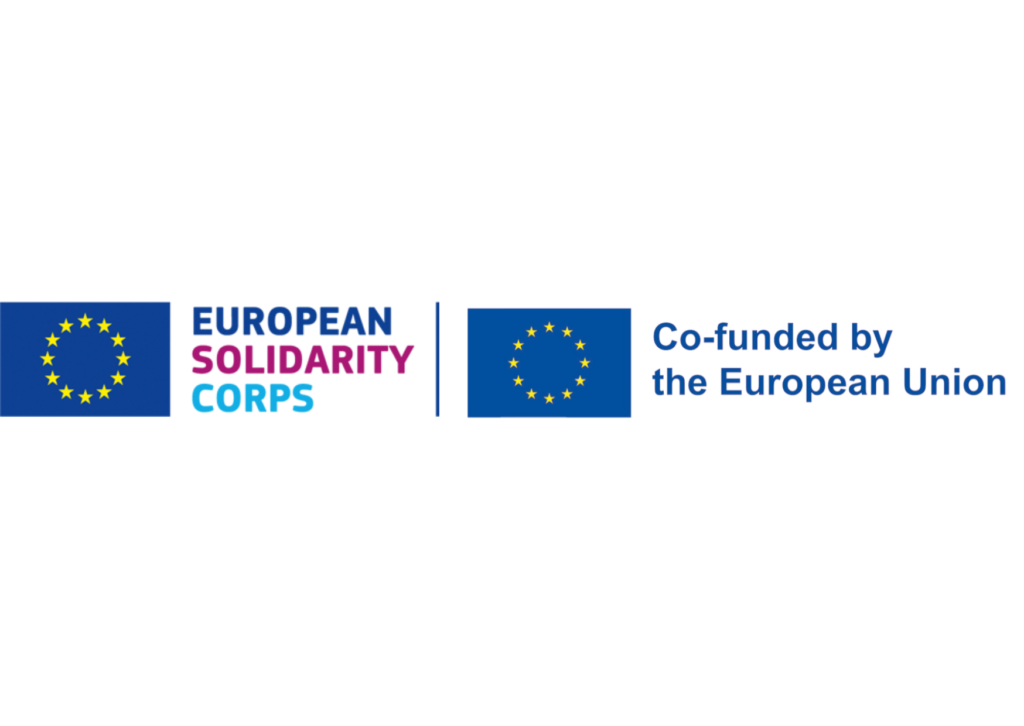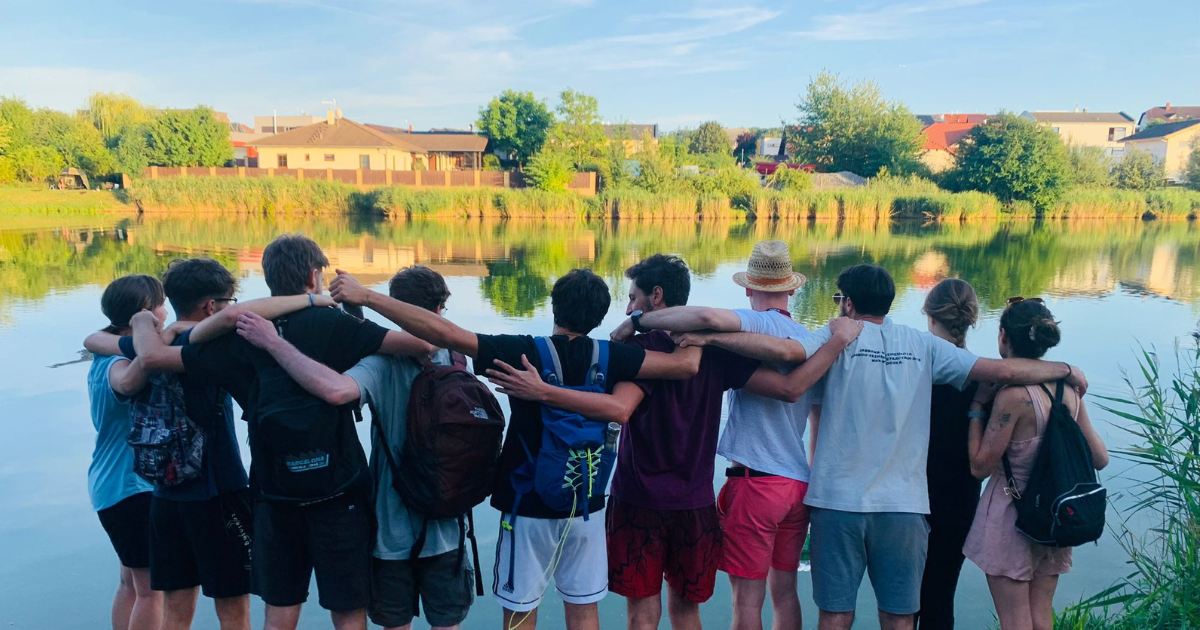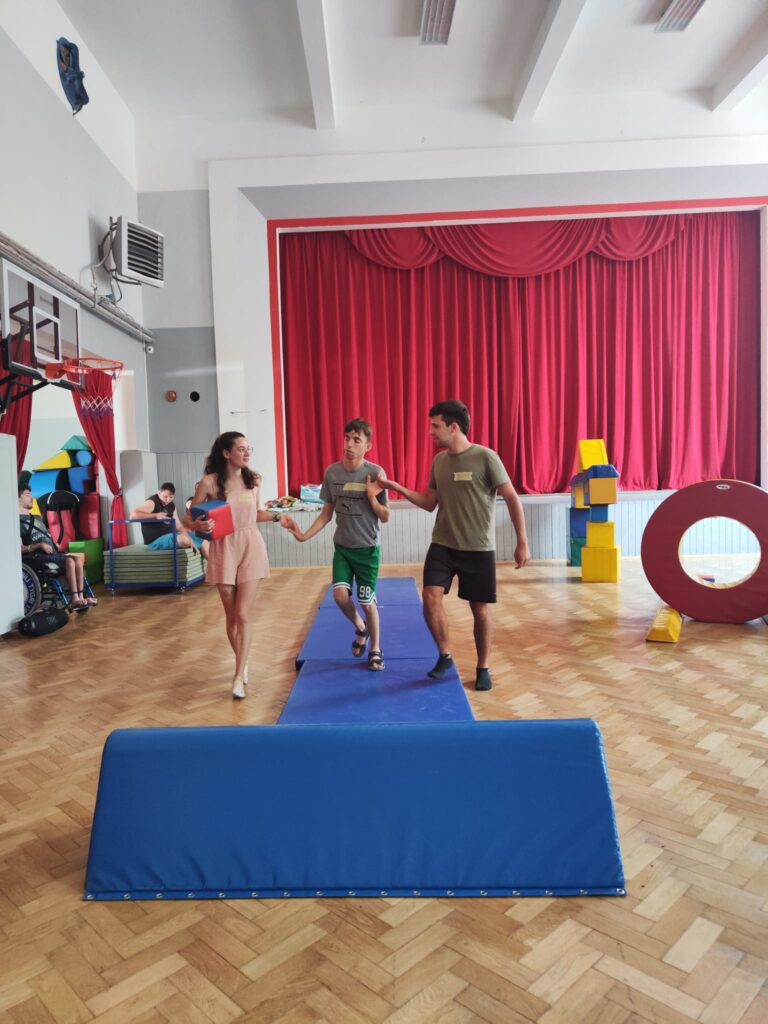Leading a workcamp was definitely a big part of my ESC project. It is a moment that every ESC volunteer looks forward to, as we have been talking about it since the beginning of the project, in February. As an incoming officer here, I spent months dealing with the applications and placement of volunteers. When the summer finally arrived, I was looking forward to the experience of finally going on the field and being part of what we had been organising for months. And let’s be honest, to leave my desk behind for a bit, meet new people and explore the Czech Republic. I had already experienced leading activities with kids, teenagers and even the elderly, but adults were a first for me!
My first workcamp was ESC Center for All, which took place in the village of Velky Osek. Me and my group of 10 volunteers took part in a summer camp for children and adults with disabilities. We created some games, we did manual activities, we sang, danced, we went for many walks in nature (nothing could stop us, not even manipulating wheelchairs on a forest path!)
My second workcamp was very different. The group was much bigger, 15 volunteers, and it took place in the town of Odolena Voda. This workcamp was organised by the municipality and the work was mainly outdoors, helping to maintain the infrastructure of the town, cleaning some areas, repainting some fences and making simple furniture like benches or playgrounds for children.
These experiences have taught me a lot and helped me develop new skills, both professional and personal. Here are the key topics I have identified as being very important when considering campleading:
To make the best out of your experience, make sure to choose the right project for you.
Pay attention to the topic of the workcamp, the size of the group and the accommodation. For example, I didn’t have any problem spending many hours a day working with children and adults with disabilities. However, I struggled when it came to picking up branches under the sun for a few hours. For some people, it would be the opposite. This is up to you, but as you should give an example and be a source of motivation for the volunteers, you should choose a project in which you feel comfortable working.
Leading a group of 10 and a group of 15 volunteers is a very different experience: The bigger the group, the more likely there is to be sub-groups or even conflicts between volunteers. In my first workcamp the group had very similar interests and was very united. In my second workcamp volunteers had different interests and they split more often into smaller groups to do different activities.
Accommodation varies depending on the workcamp. It can be in a school, in a community centre, in a hostel, common or private room, real beds or mats, etc. If you mind sharing a room with all the other volunteers and your privacy is very important to you, then pay attention to the accommodation!
Have a good relationship with the local partner.
The local partner can be a great ally in the workcamp, if the coordination between campleaders and the local partner goes well, it can change the whole outcome of the workcamp! They can give you tips or even organise activities for the volunteers with the local community, which are highly appreciated by the volunteers as it creates a more authentic experience for them.
Trust your volunteers.
There is no need to be too bossy or make too many rules. In my experience, volunteers will trust you if you set a good example by being on time, being present and spending time with each of them. In this way you can create a safe space for them to share their feelings and feedback. But to achieve this, it is important to have a lot of energy and to be ready to work!
The most important thing is to adapt to the group.
It can happen that your group of volunteers wants to party every night, or wants to have deep conversations while sharing a cup of tea at 10PM. That’s life! You cannot know in advance how the group dynamic will go, and your role is to adapt and work with it. You can change according to the group interests, the free time activities, the type of games, the schedule, and even your leadership style!
One last thing I’ve learnt from my workcamps is that just because something didn’t work with one group doesn’t mean it won’t work with another, and vice versa. Campleading is like being a little scientist, and doing experiments. You cannot have the right balance from the beginning.
I’m not going to lie, being a camp leader is a bit exhausting. There is no routine as every group and every project is different. It is a very challenging experience, but in the end, you will have amazing memories, meet interesting people and learn so much from them. I strongly believe in the power of workcamps to bring people together. Being a campleader allows you to witness the creation of new international and multicultural friendships, and that is 100% worth it.
Now you have all the info and you are ready for the challenge! So enjoy the experience, make the best out of it and good luck!












